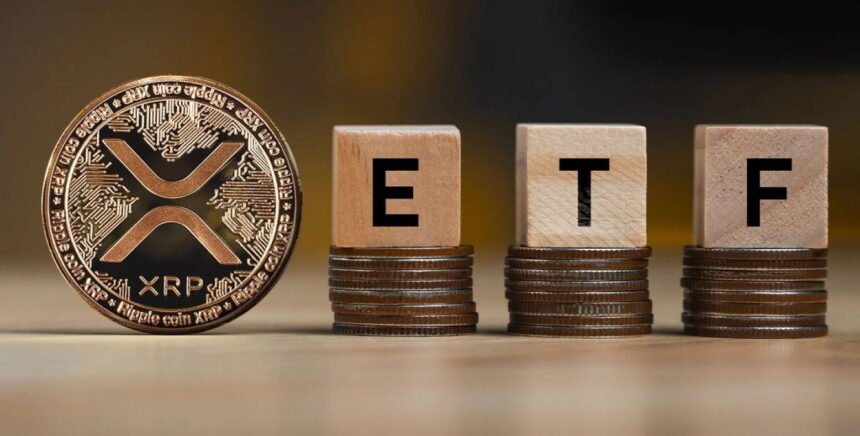Managing about $1.5 trillion in assets, Franklin Templeton, one of the biggest asset management companies worldwide, has lately put out a novel idea to start a spot XRP Faces exchange-traded fund (ETF). This application seeks to give controlled exposure to the popular cryptocurrency XRP by means of the U.S. Securities and Exchange Commission (SEC).
After Ripple Labs’ legal triumph over the SEC in 2023, XRP became much more well-known and raised digital asset optimism. But the SEC’s latest decision to postpone its decision on the application has created confusion, leaving investors and industry players waiting for clarification on the direction of the XRP ETF.
Franklin Templeton XRP ETF
Under the BZX Rule 14.11(e), which relates to Commodity-Based Trust Shares, Franklin Templeton’s idea aims to start a spot XRP ETF. Track XRP’s market price via the CME CF XRP-Dollar Reference Rate when the ETF traded on the Chicago Board Options Exchange (CBOE). The XRP holdings of the ETF would be housed by Coinbase Custody Trust Company, LLC, therefore guaranteeing the security of the digital asset for investors. Franklin Templeton’s action puts it front and first in a rising trend whereby conventional asset managers investigate the possibilities of including digital currencies like XRP into their portfolio.

Franklin Templeton’s application mirrors those of other well-known financial companies, including Grayscale, Bitwise, and Canary Capital, all of whom have also asked permission to introduce ETFs tracking XRP. These companies expect that acceptance of their XRP ETFs will assist in further validating Bitcoin from the perspective of institutional investors. Still, the SEC’s regulatory posture on digital assets remains a major obstacle in the process, and its latest postponement on ETF rulings only highlights the intricacy of the matter.
SEC Postpones XRP ETFs
The SEC said on March 11, 2025, that it was postponing its judgment on the proposed XRP ETFs from Grayscale, 21Shares, Bitwise, and Canary Capital, among several companies. The SEC said it needed more time to go over the specifics and concerns brought out in the petitions. The agency said it had decided it was “appropriate” to extend the period under which it would decide on these rule adjustments. Many were anticipating a speedy answer on the future of XRP-based investment vehicles; hence, this delay has generated considerable market anxiety (watcher.guru).
For investors, this delay serves as a mixed signal. One could argue that the SEC’s review procedure is essential to guarantee that ETFs follow the more general regulatory framework. Conversely, this protracted decision-making process raises uncertainty since many doubt if the SEC will finally approve these ETFs or place tighter limits on financial instruments connected to cryptocurrencies.
XRP Resilience and Potential
XRP has shown some resilience in the face of the postponement, despite the regulatory ambiguity around the SEC’s choice. After the news from the SEC, XRP’s price decreased momentarily by roughly 1.2%, hitting an intraday low of $2.2 (u.today). This decline was fleeting, though, and XRP recovered, gaining by about 4% in 24 hours. This price behavior emphasizes the speculative character of the bitcoin market since traders and investors respond to both official news and more general market trends.
Major asset management companies like Franklin Templeton’s participation have inspired hope for XRP and other cryptocurrencies as investment vehicles going forward. Should approval be granted, XRP ETFs might provide a means for additional institutional capital to enter the digital asset market, therefore validating it and extending its influence.
SEC’s XRP Impact
The SEC’s handling of XRP ETF applications has broader implications for the entire cryptocurrency market. The decision on whether to approve these products could set a precedent for how other cryptocurrencies—such as Solana, Litecoin, and Dogecoin—are treated by regulators. A favorable decision for XRP ETFs might pave the way for the development of similar financial products for other digital assets, encouraging more traditional investors to participate in the crypto market. Such an outcome could lead to a more diversified cryptocurrency investment landscape that includes both established and emerging tokens.
On the other hand, a denial of the XRP ETFs could send a negative signal to the market, reinforcing the view that digital assets face significant regulatory challenges in the United States. It could also lead to a shift in the market as firms look to list their products in jurisdictions with more favorable regulations. The SEC’s stance on XRP will likely influence the approach taken by other countries’ regulators toward cryptocurrency-related financial products.
XRP ETF Decision
Though the exact date is yet unknown, the SEC’s ruling on Franklin Templeton’s XRP ETF application is expected to be made within the next several months. Many in the crypto scene are wary, waiting for the SEC’s decision due to the delay. While a rejection may further complicate the scene for digital assets in the United States, the acceptance of a regulated XRP ETF could indicate the start of a new era for cryptocurrency investments for institutional investors.

Right now, the community of cryptocurrencies has to be patient as the legislative process unfolds. This choice will not only impact XRP but also determine the direction of crypto-related financial goods for next year.
Final thoughts
In essence, Franklin Templeton’s XRP ETF proposal marks a turning point on the road toward institutional acceptance of digital assets, but the SEC’s delay adds some degree of doubt. The future of XRP—and its position in the larger financial ecosystem—hangs in the balance as both investors and business leaders await clarity.





